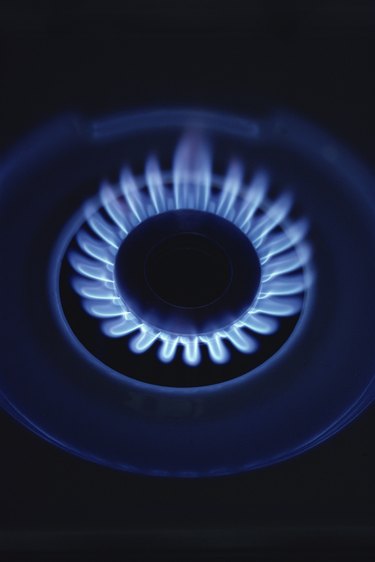
The gas pressure that goes to your stove needs to be delivered at a constant and specific pressure that's right for the appliance. For this reason, the regulator on your stove keeps the gas flowing at the right pressure. A leaky regulator is dangerous since it can lead to a gas explosion.
Problems
Video of the Day
Regulators can malfunction if they're not installed correctly. Connections to the regulator must be wrench-tight. However, if the connections are tightened too much, the regulator can crack and start to leak. Regulators can also malfunction if the gas pressure is too high and exceeds the regulator rating. This can happen when the spring inside the regulator becomes weak or if the regulator is adjusted improperly.
Video of the Day
Pressure
If the pressure from the regulator is too high, the flame on your stove may be too big. Natural gas systems are designed to operate at a pressure of around .25-pound per square inch (psi). Propane systems are designed to operate at a pressure of about .397 psi. The actual pressure at your stove can vary, depending on the size of the piping, the distance the gas has to travel and the number of appliances hooked up to the system.
Testing
A manometer is a gauge that licensed gas plumbers and HVAC contractors use to test propane systems for leaks. It can also be used to measure the gas pressure that the regulator delivers to the stove. The correct pressure setting for your regulator can be found on the gas valve.
Replacement
Regulators aren't meant to be repaired, only replaced. Their normal lifespan is around 15 years. However, if there is flooding or other water damage, your regulator will need to be replaced immediately. Buying and installing the wrong regulator for your stove may mean the stove won't work and may even be illegal. A licensed LP gas plumber can replace the regulator and make any necessary adjustments.
Safety
If you smell gas, you need to leave your home immediately and call your gas company and local fire department from a neighbor's phone. Do not use your own phone, light a match or turn appliances or lights on or off as they can cause a spark that will ignite the gas. Other signs of a gas leak include a hissing or blowing sound near the stove.
- Appliance Assistant: Cookin’ With Gas
- Propane 101: Propane Regulators
- InspectAPedia: How to Inspect & Test LP or Natural Gas Regulators & Controls on Appliances, Heaters, Water Heaters
- Wolf Gas Cooktops: Installation Guide
- InspectAPedia: LP Gas, Propane Gas, & Natural Gas Pressures & Pressure Settings
- First Choice Home Inspections: Natural Gas Safety Information
- InspectAPedia: Find Leaks in Gas Piping -- How to Identify & Correct LP Gas or Natural Gas Leaks
- RV Mobile: Gas Pressure and the Manometer
- Iowa State University Department of Agricultural and Biosystems Engineering: Black Streaks (Ghosting) on Walls
- InspectAPedia: How to Inspect & Test LP or Natural Gas Regulators & Controls on Appliances, Heaters, Water Heaters
- EasternPropane: Detecting a Propane Leak